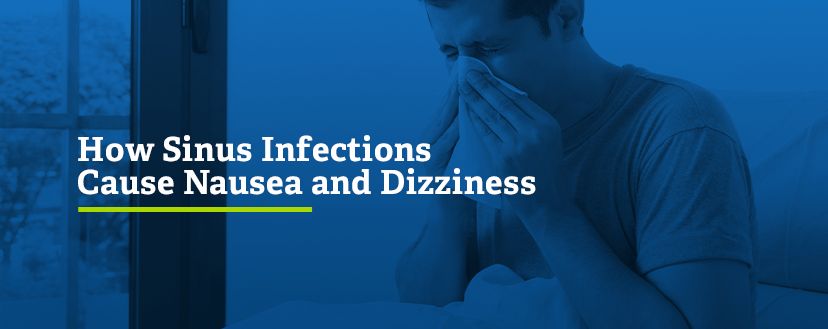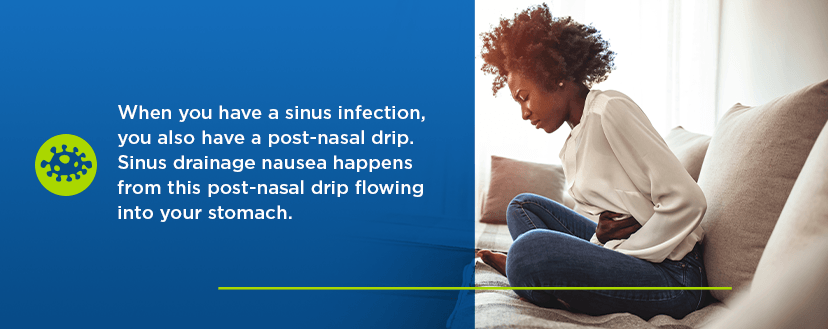
If you’ve felt acute pain and pressure behind your cheeks and forehead, chances are you’ve had a sinus infection. You might have also experienced other symptoms that didn’t seem related to your sinuses, such as dizziness or nausea. Are those symptoms linked? Read on to find out more about your sinuses, what can cause an infection and what symptoms to look for.
Table of Contents
- What Are Your Sinuses?
- Symptoms of a Sinus Infection
- Causes of Sinus Infection Vertigo or Dizziness
- Causes of Sinus Infection Nausea
- What to Do if You’re Experiencing Severe Nausea and Dizziness
- Choose the Expert in Nasal and Sinus Treatment
What Are Your Sinuses?
Behind the bones of your face are four pairs of air cavities — your sinuses. Their primary role is to produce mucus that moisturizes the nasal passage and to ward off pollutants and microorganisms. Because they’re usually filled with air, sinuses also help to lighten the weight of your skull.
When the sinus tissue becomes irritated or inflamed, the cavities can fill with fluid and blockages can result. Colds, allergies or physical conditions such as polyps or a deviated septum can all create blockages. Sinusitis occurs when the blocked fluid becomes infected as a result of fungal, viral or bacterial colonization.
Symptoms of a Sinus Infection
The following symptoms can accompany a sinus infection:
- Fatigue
- Bad breath
- Facial pain and tenderness
- Dental pain
- Headaches
- Nighttime coughing
- Dizziness
- Nausea
Causes of Sinus Infection Vertigo or Dizziness
As listed above, some people may experience vertigo or dizziness with a sinus infection. Vertigo describes a severe type of dizziness that feels like your body spins or moves while standing still. This separates it from lightheadedness, which makes you feel faint. Lightheadedness goes away shortly after lying down. However, dizziness or vertigo persists even after you recline. Discover how your sinus problem could cause this issue and what you need to do about it.
How Sinus Infections Can Lead to Dizziness
Sinus infections happen when your sinus passages have inflammation and congestion. These factors contribute to pressure and sinus headaches. This inflammation or blockage may also affect your ears, resulting in dizziness from pressure or an infection.
Sinus problems may also contribute to ear infections that could cause dizziness or lightheadedness. For instance, middle ear infections may result from allergies or blockage of the Eustachian tubes, which can also cause sinusitis. Middle ear infections may cause a discharge from your ears in some cases.
If your sinus issues affect your inner ears, you could experience labyrinthitis. In addition to dizziness, you may also experience nausea and vomiting from this condition.
How to Treat Sinus-Infection-Related Dizziness
To treat lightheadedness, get as much rest as you can because the light feeling in your head should pass when you lie down. For dizziness, you will need to treat your sinus problems.
When treating sinus or ear problems that cause dizziness at home, never use ear candling to remove wax from the ears. These products are so dangerous that the Food and Drug Administration (FDA) issued a warning in 2010 against their use. The organization noted that this method poses a risk for burns and does not have any scientific evidence to support its use to remove ear wax or help ear infections.
If you have allergies that contribute to your sinus problems, take antihistamines to reduce the allergic reaction and mucus buildup in your sinuses. Next, try decongestants to reduce inflammation and congestion in your sinus passages. While decongestants can ease sinus pressure and subsequent dizziness, do not take them for an extended time without consulting with your doctor. Nasal decongestant sprays can have a rebound effect and cause worse congestion if used for several days in a row.
If you continue to feel dizziness or lightheadedness after treating your problem at home, call a doctor to see if you need a prescription or an alternative treatment to help your sinus or ear problems.
Causes of Sinus Infection Nausea
Sinusitis can lead to nausea in some people. Learn about how nasal congestion can cause that queasy feeling in your stomach and what to do about it.

How Sinus Infections Lead to Nausea
When you have a sinus infection, you also have a post-nasal drip. Sinus drainage nausea happens from this post-nasal drip flowing into your stomach. Nausea can be worse when you have an empty stomach. Unfortunately, post-nasal drip often worsens at times when you have an empty stomach, like in the middle of the night and early morning.
As noted, sinus infections can cause dizziness from ear infections or pressure. This feeling of movement and being off-balance could also make you feel nausea. In fact, another symptom of labyrinthitis, which also causes dizziness, is nausea. Treating the sinus problem will alleviate both dizziness and nausea.
To avoid nausea caused by post-nasal drip, you can gently blow your nose to get some congestion out of your nasal passages. You may also try a sinus rinse with a neti pot.
Use caution when rinsing with neti pots. While the Food and Drug Administration (FDA) notes that sinus rinse products are safe when used and cleaned properly, some people make mistakes during use. If using untreated tap water, you risk a parasitic infection. Follow these recommendations from the Centers for Disease Control (CDC) for treating water to use in a neti pot:
- Purchase distilled water from the store for the safest option.
- Boil tap water for one minute, or three minutes at higher elevations, and let it cool before adding to the neti pot as an alternative to distilled water.
- Filter water through an NSF 53 or NSF 58 filter only if you cannot boil water or obtain distilled water.
- Disinfect water with bleach only if you cannot use distilled, boiled or filtered water. Do not drink this treated water. If the water is clear, use five drops of bleach per quart of water if the bleach has a concentration of 4% to 5.9%. For bleach with 6% to 8.25% concentration, reduce the amount to four drops per quart of clear water. Double the bleach used if treating cloudy water.
How to Treat Sinus-Infection-Related Nausea
While preventing sinus drainage nausea can help, if you already have this symptom, you do have options for easing the discomfort at home:
- Get as much rest as you can to allow your body to fight the sinus infection.
- Try crackers, dry toast or other bland food if your stomach is empty and you feel nauseous.
- Drink plenty of fluids to thin mucus and prevent dehydration.
- Enjoy noncaffeinated, hot herbal teas for soothing heat to unclog sinuses, ease sinus pressure and help mucus flow out of the nose instead of down into your stomach.
While the above methods can ease your nausea symptoms, you should still talk to a doctor about treating your sinus infection. Getting relief from nasal congestion and post-nasal drip will cure your nausea more effectively than temporary home remedies.
What to Do if You’re Experiencing Severe Nausea and Dizziness
Sinus infections can become chronic sinusitis. If you have sinusitis for fewer than four weeks, doctors consider it an acute condition. However, if the problem persists for more than 12 weeks, you have chronic sinusitis. You may also have recurrent sinusitis, which is a sinus infection that happens multiple times throughout the year. While acute cases may resolve themselves, you may need medical assessment and care if you experience any of the following:
- Severe nausea
- Severe dizziness
- Sinus infection symptoms for more than 12 weeks
- Multiple sinus infections in a year
- A fever that lasts for more than a week
A doctor can help treat the sinus infection causing severe dizziness or nausea. Additionally, a physician can prescribe stronger medications for these conditions than you can get over the counter. To get relief from your persistent or severe symptoms, either book an assessment or request an appointment for a telehealth visit.
Choose the Expert in Nasal and Sinus Treatment
Dr. Nguyen is a national expert in the treatment of nasal conditions, responsible for perfecting innovative and effective treatments like balloon sinuplasty. At Houston Sinus and Allergy, we utilize the newest technology and our extensive experience to find the best solution for the health of your nose and sinuses.
You can reach us by calling (832) 237-7777, or fill out the form at the top of the page to book an assessment to start feeling better!


My husband suffers a lot from sinus, can you get you sinus removed
Please send information regarding sinusitis.
Regards
Chiti
Hi Chiti,
Thank you very much for the comment. You can find more information regarding Sinusitis in this page about Sinus Infection.
If you need more specific information, please feel free to contact our clinic or call us at 832-237-7777
Hope it helps!
Hi Ann,
Thank you very much for the question. There are many approaches to stopping the suffer from sinus. Please contact our clinic or call 832-237-7777 for a more detailed assessment with our doctor. He will discuss with you and your husband about the most appropriate method.
Hope it helps.
I have had chronic sinus infections for the past 4 years. Recently i have been having symptoms of nausea, head aches, major pressure in my sinus, etc. the most debilitating of these is the nausea. last week i had my sinus x-rayed and today my doctor told me that i have a cyst in my sinus and referred me to an ENT specialist.
is it likely that my nausea is caused by the cyst?
Hi my names Josh I’ve recently just had a cold with a headache my nose was bunged up and my throat felt the same I felt nausea and wasn’t sick and a ticklish caught to go with it, I’ve recently given up smoking. I wonder if there’s any side affects from stopping smoking ???
I have a stuffy nose, am on soloan tablets as I also have asthma, and get hayfever, for thefirst time I was feeling so dizzy, and felt tingling on both legs one at a time which reached past my ankles and then went onto my hands like pins and needles one part of the body each time lasted a few minutes on each area, woke up this morning and gosh was sreally unbalanced, and felt nauseated but the nose was not that blocked however I had to use my ,to breath toot never the dizzy part, ears were ok when checked but now irritating a bit no antibiotics given just a nasal spray, I dont fell that much stuffy but the dizziness is still there, even when he pressed around the eyes nose etc it did not hurt as much could it be the sinus that is causing this. when I bend it is worse
but the doctor did not sk me to bend just close my eyes with hands strected out to check the balance
Thanks
HG.
I have sinus problems. Only, twice a year for at least a couple of weeks; I get dizzy and nausea and throw up, this happens twice a year when the weathwr changes. What can be done? When I get these symptoms I pump up on vitamin c. It seems to take care of it.
I’m having drainage. I always believed it to be my sinuses. But, in the last week, I’ve been gagging at certain smells, and actually vomiting at times. Is that a symptom of a sinus infection?
Hi, I have suffered with sinus problems for years.
From blocked nasal passages to fluid build up in ears, headaches, facial pain, dizziness. Vomiting mucus when collecting or it apppears to go into stomach.
All not very nice.
I attend E.N.T. Recently received grommet insertion unnder local anesthetic to help ventilate inner ear, thus behind ear drum, where fluid collects and cant escape. The term called glue ear.
This grommet will stay situated within ear for approiximately a year. When it will fall out itself and hole in ear drum should close naturally.
By that time hopefully that would of dried out fluid from inner ear.
I didnt find operation painful.
Though in general when i have blocked nasal passage i use steam to open tubes and also kuse sterimar spray. It is sea water all sterile and natural product. Would be able to locate online to order.
Apparently eating antitoxant food such as red grapes is good for your sinuses.
Also consuming plenty fluids.
I find damp wet weather causes more mucus secreetions and it can be chronic,. Thats when you receive a build up of fluids.
They say it is wise in the winter to keep your mouth and nose covered with a scarf. Possibly temperature and weather changes may obviously cause issues with sinuses i assume.
You can make up your own saline solution to flush out your nasal passage. Using warm water, rock or sea salt and bicarbonate of soda.
Think it is half a pint of the water then one tablespoon salt and teaspoonful bicarbonate soda.
Place some saline on a steaspoon and close one nostral and sniff the saline up other nostral.
Then blow nose.
This should help with infection and flush anything out of passage.
Alison
I have had an infected sinus for three months,following a dental extraction.Dentist at first gave me antibiotics,but these fail to work. I have had ordinary sinus problems for years,and take citirizine.But I have never had anything this bad.The smell makes me constantly nauseated,and I vomit almost every morning. I really do not have a clue what to do.
Two doctors at my Health Centre have given advice.The last one made the problem ten times worse! Does anyone have tried and tested ideas which actually work?
hi,i just had same thing happen and still am ,i am on antibiotics and i eat activa to get some of the nasuea away ..it come and goes .i am 48 and neveer experinced so much pain for so long…good luck
[…] + View Here […]
I got the Cova 19 in January of this year and I have been dizzy every sense my sinus does not drain no sneezing no cough just a lot of pressure around my face and my head in my ears feels very full I’ve been using the sinus rinse it doesn’t seem to do any good I just wish my nose would run or I could sneeze to clear it is I have tried things on the market but nothing is working just a lot of pressure is there anything that I can take for those I would really appreciate it I am 75 female in good health except for that doctor says that I have vertigo I’ve had so much treatments physical therapy also put a tube in my ear no drainage. My doctor gave me some sinus pills and a decongestant but I did read up on about until today stuff is for if you have watery eyes sneezing or runny nose I have none it is it’s just nothing but pressure. I would love your help I have been taken the decongestion spray for the last year thank you so much.
[…] Seni e allergie di Houston spiega, le cellule specializzate nei seni producono muco per idratare i passaggi nasali e […]
Have you found anything thatd helped I am having this now after having covid 9 months ago
I have severe headaches every day for years. I take tylenol which works for a few hours. Lately for about 2 months I’ve been having nasal problems when I cannot breathe at all through my nose…thus happens randomly throughout the day and night. Within the last few months I’ve also developed severe nausea with dry heaves. I had a triple bypass about 3 years ago and I just turned 70. My health provider authorized celebrex for my arthritis pain. She also authorized antibiotics for my nasal problems which didn’t work at all. My head aches weren’t addressed at all although I told her about them.
This was an eye-opening read! I never realized how closely related dizziness and nausea are to sinus infections. It’s fascinating how interconnected our body systems are. Thanks for breaking it down so clearly!